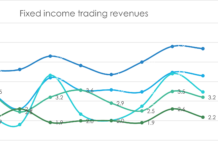By Flora McFarlane.
Market operator Nasdaq has reported second quarter revenues from fixed income, commodities and currency (FICC) remained at US$19 million from Q1 2017, having fallen US$2 million on the same quarter last year. Adena Friedman, chief executive and Michael Ptasznik, chief financial officer announced on their earnings call with analysts that the fall was due to lower industry volumes in European and commodities products.
Nasdaq’s fixed income and commodities trading and clearing revenues accounted for 3% of total net revenues and covers US fixed income, its US futures exchange and Nordic fixed income business, clearing house and power business. It operates the eSpeed interdealer market for US Treasuries.
Overall the firm recorded quarterly net revenue was up 8% from Q2 2016, with market services reporting a net revenue of 14%. A large proportion of the growth was attributed to the acquisitions of International Securities Exchange (ISE) and Boardvantage in 2016, in particular the impact of ISE on market services revenues.
The growth in market services saw total revenues less transaction-based expenses coming to US$222 million, up from US$218 million in Q1 and Q2 2016’s US$194 million.
As a result of the 2016 acquisition of ISE, Nasdaq reported double figure increases in revenue of 48% and 14% in equity derivatives trading and clearing, and trade management service, respectively.
When asked about fixed income, a relatively small proportion of total revenues, CEO Adena Friedman said, “The macro backdrop across our fixed platform in terms of volumes in general has been low… In terms of our competitive position, it has been our biggest area of challenge within Nasdaq.”
Friedman added that Nasdaq has already taken steps to address the challenge, through the streamlining of all the trading businesses into a single organisation under executive vice president of global market services, Tom Wittman.
Looking to build on the activity deployed across Nasdaq’s equities and options businesses and the derivatives businesses in Europe, the company hopes to apply the strategies to the areas of challenge within the business, to improve the company’s fixed income offering.
Friedman said that the unification of management of all market services businesses reflects the general trend of customers bringing their electronic trading across multiple asset classes into “a more holistic management and organisational structure.”
©TheDESK 2017
©Markets Media Europe 2025












